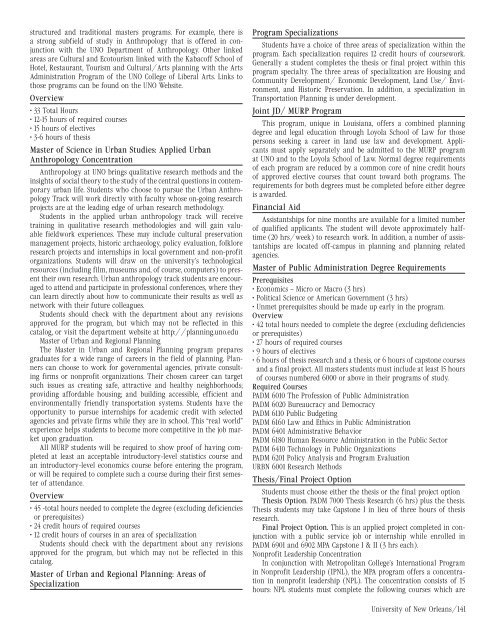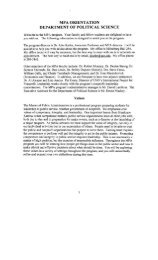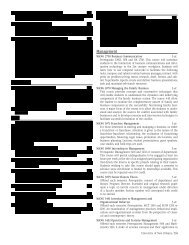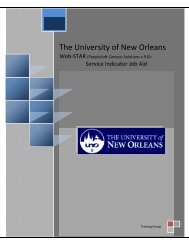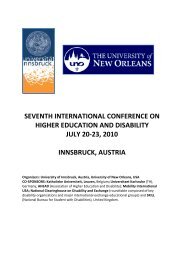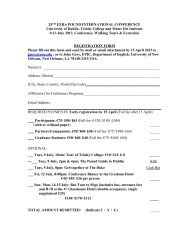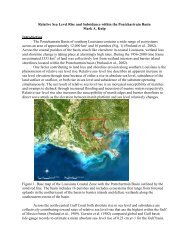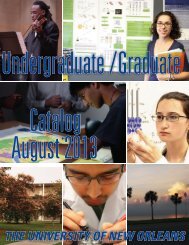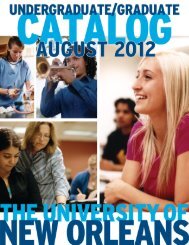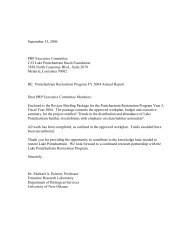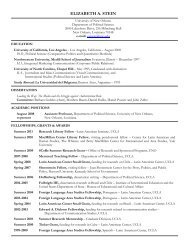Untitled - University of New Orleans
Untitled - University of New Orleans
Untitled - University of New Orleans
You also want an ePaper? Increase the reach of your titles
YUMPU automatically turns print PDFs into web optimized ePapers that Google loves.
structured and traditional masters programs. For example, there is<br />
a strong subfield <strong>of</strong> study in Anthropology that is <strong>of</strong>fered in conjunction<br />
with the UNO Department <strong>of</strong> Anthropology. Other linked<br />
areas are Cultural and Ecotourism linked with the Kabac<strong>of</strong>f School <strong>of</strong><br />
Hotel, Restaurant, Tourism and Cultural/Arts planning with the Arts<br />
Administration Program <strong>of</strong> the UNO College <strong>of</strong> Liberal Arts. Links to<br />
those programs can be found on the UNO Website.<br />
Overview<br />
• 33 Total Hours<br />
• 12-15 hours <strong>of</strong> required courses<br />
• 15 hours <strong>of</strong> electives<br />
• 3-6 hours <strong>of</strong> thesis<br />
Master <strong>of</strong> Science in Urban Studies: Applied Urban<br />
Anthropology Concentration<br />
Anthropology at UNO brings qualitative research methods and the<br />
insights <strong>of</strong> social theory to the study <strong>of</strong> the central questions in contemporary<br />
urban life. Students who choose to pursue the Urban Anthropology<br />
Track will work directly with faculty whose on-going research<br />
projects are at the leading edge <strong>of</strong> urban research methodology.<br />
Students in the applied urban anthropology track will receive<br />
training in qualitative research methodologies and will gain valuable<br />
fieldwork experiences. These may include cultural preservation<br />
management projects, historic archaeology, policy evaluation, folklore<br />
research projects and internships in local government and non-pr<strong>of</strong>it<br />
organizations. Students will draw on the university’s technological<br />
resources (including film, museums and, <strong>of</strong> course, computers) to present<br />
their own research. Urban anthropology track students are encouraged<br />
to attend and participate in pr<strong>of</strong>essional conferences, where they<br />
can learn directly about how to communicate their results as well as<br />
network with their future colleagues.<br />
Students should check with the department about any revisions<br />
approved for the program, but which may not be reflected in this<br />
catalog, or visit the department website at http://planning.uno.edu<br />
Master <strong>of</strong> Urban and Regional Planning<br />
The Master in Urban and Regional Planning program prepares<br />
graduates for a wide range <strong>of</strong> careers in the field <strong>of</strong> planning. Planners<br />
can choose to work for governmental agencies, private consulting<br />
firms or nonpr<strong>of</strong>it organizations. Their chosen career can target<br />
such issues as creating safe, attractive and healthy neighborhoods;<br />
providing affordable housing; and building accessible, efficient and<br />
environmentally friendly transportation systems. Students have the<br />
opportunity to pursue internships for academic credit with selected<br />
agencies and private firms while they are in school. This “real world”<br />
experience helps students to become more competitive in the job market<br />
upon graduation.<br />
All MURP students will be required to show pro<strong>of</strong> <strong>of</strong> having completed<br />
at least an acceptable introductory-level statistics course and<br />
an introductory-level economics course before entering the program,<br />
or will be required to complete such a course during their first semester<br />
<strong>of</strong> attendance.<br />
Overview<br />
• 45 -total hours needed to complete the degree (excluding deficiencies<br />
or prerequisites)<br />
• 24 credit hours <strong>of</strong> required courses<br />
• 12 credit hours <strong>of</strong> courses in an area <strong>of</strong> specialization<br />
Students should check with the department about any revisions<br />
approved for the program, but which may not be reflected in this<br />
catalog.<br />
Master <strong>of</strong> Urban and Regional Planning: Areas <strong>of</strong><br />
Specialization<br />
Program Specializations<br />
Students have a choice <strong>of</strong> three areas <strong>of</strong> specialization within the<br />
program. Each specialization requires 12 credit hours <strong>of</strong> coursework.<br />
Generally a student completes the thesis or final project within this<br />
program specialty. The three areas <strong>of</strong> specialization are Housing and<br />
Community Development/ Economic Development, Land Use/ Environment,<br />
and Historic Preservation. In addition, a specialization in<br />
Transportation Planning is under development.<br />
Joint JD/ MURP Program<br />
This program, unique in Louisiana, <strong>of</strong>fers a combined planning<br />
degree and legal education through Loyola School <strong>of</strong> Law for those<br />
persons seeking a career in land use law and development. Applicants<br />
must apply separately and be admitted to the MURP program<br />
at UNO and to the Loyola School <strong>of</strong> Law. Normal degree requirements<br />
<strong>of</strong> each program are reduced by a common core <strong>of</strong> nine credit hours<br />
<strong>of</strong> approved elective courses that count toward both programs. The<br />
requirements for both degrees must be completed before either degree<br />
is awarded.<br />
Financial Aid<br />
Assistantships for nine months are available for a limited number<br />
<strong>of</strong> qualified applicants. The student will devote approximately halftime<br />
(20 hrs/week) to research work. In addition, a number <strong>of</strong> assistantships<br />
are located <strong>of</strong>f-campus in planning and planning related<br />
agencies.<br />
Master <strong>of</strong> Public Administration Degree Requirements<br />
Prerequisites<br />
• Economics – Micro or Macro (3 hrs)<br />
• Political Science or American Government (3 hrs)<br />
• Unmet prerequisites should be made up early in the program.<br />
Overview<br />
• 42 total hours needed to complete the degree (excluding deficiencies<br />
or prerequisites)<br />
• 27 hours <strong>of</strong> required courses<br />
• 9 hours <strong>of</strong> electives<br />
• 6 hours <strong>of</strong> thesis research and a thesis, or 6 hours <strong>of</strong> capstone courses<br />
and a final project. All masters students must include at least 15 hours<br />
<strong>of</strong> courses numbered 6000 or above in their programs <strong>of</strong> study.<br />
Required Courses<br />
PADM 6010 The Pr<strong>of</strong>ession <strong>of</strong> Public Administration<br />
PADM 6020 Bureaucracy and Democracy<br />
PADM 6110 Public Budgeting<br />
PADM 6160 Law and Ethics in Public Administration<br />
PADM 6401 Administrative Behavior<br />
PADM 6180 Human Resource Administration in the Public Sector<br />
PADM 6410 Technology in Public Organizations<br />
PADM 6201 Policy Analysis and Program Evaluation<br />
URBN 6001 Research Methods<br />
Thesis/Final Project Option<br />
Students must choose either the thesis or the final project option<br />
Thesis Option. PADM 7000 Thesis Research (6 hrs) plus the thesis.<br />
Thesis students may take Capstone I in lieu <strong>of</strong> three hours <strong>of</strong> thesis<br />
research.<br />
Final Project Option. This is an applied project completed in conjunction<br />
with a public service job or internship while enrolled in<br />
PADM 6901 and 6902 MPA Capstone I & II (3 hrs each).<br />
Nonpr<strong>of</strong>it Leadership Concentration<br />
In conjunction with Metropolitan College’s International Program<br />
in Nonpr<strong>of</strong>it Leadership (IPNL), the MPA program <strong>of</strong>fers a concentration<br />
in nonpr<strong>of</strong>it leadership (NPL). The concentration consists <strong>of</strong> 15<br />
hours: NPL students must complete the following courses which are<br />
<strong>University</strong> <strong>of</strong> <strong>New</strong> <strong>Orleans</strong>/141


